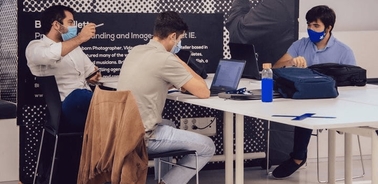- Home
- We Are Law School
- News
- Ie Law School’s Legal Clinic Contributes To Improving Indigenous Groups’ Quality Of Life
IE Law School’s Legal Clinic contributes to improving Indigenous groups’ quality of life

IE’s Legal Clinic students assisted in establishing the legal framework for Arquetipos’ new project, which aims to improve the lives of Indigenous groups. Learn about their experience.
IE Law School’s Legal Clinic students assisted in establishing the legal framework for Arquetipos’ new project, which aims to improve the lives of Indigenous groups. “We were enormously motivated by the prospect of establishing solid alliances with legal professionals and law students who offer their services for such important causes,” explains Arquetipos’ director, Miguel Cuberos.
Arquetipos was recently founded with the aim of fostering the economic development of Indigenous groups, and preserving their ancestral knowledge, to reinforce their value as benchmarks in the fight against climate change. With this goal in mind, they developed Life Plan, an autonomous collective organizational tool that aims to maintain a dialogue between Indigenous communities and the state regarding land management. Arquetipos plan to put this idea into practice with the pilot project in Huottuja, an Indigenous community in the Amazon. This was the first step in a series of legal challenges that the IE Legal Clinic bachelor and master’s students—led by professors Sara Sánchez and Francisco de Elizalde—had to face.
“We had the fantastic opportunity to work with the Legal Clinic program at a very opportune moment,” said Cuberos, who also highlights the support of Hogan Lovells, one of the law firms that collaborates with the Legal Clinic in order to aid students’ studies. “Projects like Arquetipos offer students the chance to put into practice the knowledge they acquire during their studies, as well as acting as their first experience advising clients on legal issues,” notes Silvia Muñoz, Junior Associate at Hogan Lovells, who worked alongside students and the NGO.
“The Legal Clinic offers you the chance to be in direct contact with clients and contribute to enriching projects. My team and I offered Arquetipos legal advice in a holistic manner, focusing on the protection of their work methodology.”
The Legal Clinic worked to protect the organization’s operations methodology and the project’s data in accordance with Spanish legislation. Students also explored the various public grants the project could apply for, as well as drafting a volunteer agreement and the collaboration agreement between Arquetipos and the University Carlos III of Madrid.
The Life Plan project encourages economic development that goes beyond traditional indicators, rooting economic growth in human and environmental rights. In light of this, the NGO needed legal advice to explore the possibility of preserving Indigenous communities’ local products by collective trademarks and protected designation of origin (PDO) labels. “With this strategy, we aim to not only protect a specific brand, but also the culture behind it,” highlights the Arquetipos director.
The cooperation between Arquetipos, Hogan Lovells and the Legal Clinic was positive for all parties, as master’s student María Chavarri points out: “The Legal Clinic offers you the chance to be in direct contact with clients and contribute to enriching projects. My team and I offered Arquetipos legal advice in a holistic manner, focusing on the protection of their work methodology.” Silvia Muñoz explains that the experience offered her the chance to exchange ideas with students and develop training and team management skills, while Cuberos highlights the added push in “ambition and motivation” the NGO got from working with IE Law School.“It was a pleasure to act as the link between first-class professionals and unheard legal claims in the heart of the Amazon, one of the most important places on the planet.”
The group confronted the challenge of working during the pandemic head on, thanks to the close teamwork of the IE Law School team. As Cuberos explains, “At every moment we felt attended to and supported while transitioning through a collectively uncertain phase that forced us to reconfigure our plans of action. The advice given was key when it came to redirecting our strategies.” It was an experience that the Arquetipos director hopes to repeat in the near future: “Uniting Indigenous communities and IE University with our international cooperation proposal is proof of the great things we can achieve together. We hope to continue to share new spaces for collaboration and cooperation.”